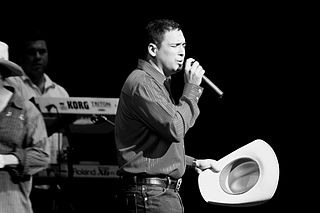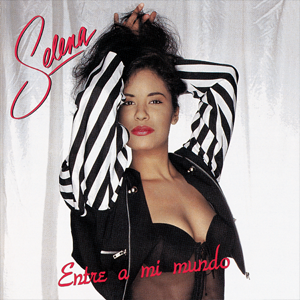| Tejano Music Award for Single of the Year | |
|---|---|
| Awarded for | Single of the Year |
| Country | United States |
| Presented by | Local television and radio stations |
| First awarded | 1981 |
| Currently held by | Selena (1995) |
| Most awards | Mazz (4) |
| Website | Tejano Music Awards |
The Tejano Music Award for Single of the Year was an honor presented annually at the Tejano Music Awards from 1981 to 1995. The category was retired, while eligible entries were nominated for the Tejano Music Award for Song of the Year and the genre-specific categories Tejano Crossover, Mexican Regional Song, and Tejano Country Song of the Year. The only English-language recording to have won the award (and to be nominated) was "Oh Girl" by La Mafia in 1983, which was included on Honey , which also won Album of the Year. The most awarded artist is Mazz, who holds four wins, while Luis Silva remains the most awarded songwriter.
| Year | Songwriter(s) | Work | Performing artist(s) | Nominees | Ref. |
|---|---|---|---|---|---|
| 1981 | Luévano Marentes | "Senorita Cantinera" | Roberto Pulido | [1] | |
| 1982 | Johnny Herrera | "Si Querida Verme Llorar" | Lisa Lopez | [1] | |
| 1983 | Bobby Russell | "Honey" | La Mafia | [1] | |
| 1984 | Luis Silva | "Tu, Tu y Solo Tu" | La Mafia |
| [1] |
| 1985 | Benjamin Sánchez Mota | "Mi Loca Pasion" | La Mafia | [1] | |
| 1986 | Carlos Cárdenas | "Un Rinconcito En El Cielo" | Ramón Ayala | [1] | |
| 1987 | Luis Silva | "Entre Mas Lejos Me Vaya" | David Marez | [1] | |
| 1988 | Luis Silva | "Amor Querido" | Ramiro "Ram" Herrera | [1] | |
| 1989 | Juan Solis | "Ay Mujer" | Latin Breed | [1] | |
| 1990 | Juan Manuel Barco | "Ahora Quiero Que Me Quieras" | Mazz |
| [2] |
| 1991 | Unknown | "Amor Con Amor" | Mazz |
| [3] |
| 1992 | Lalo Rodríguez | "Ven Devorame Otra Vez" | Mazz | [1] | |
| 1993 | Joe Lopez | "Lo Voy Hacer Por Ti" | Mazz |
| [4] |
| 1994 | Calixto Ochoa | "La Charanga" | Fandango USA |
| [5] |
| 1995 | A.B. Quintanilla | "Amor Prohibido" | Selena |
| [1] |

Jose Roberto Pulido Jr., known professionally as Bobby Pulido, is an American singer, songwriter, guitarist, and actor. He is credited for introducing Tejano music to a youthful crowd and became a teen idol and one of the most influential Tejano recording artists among Mexican American teenagers.

Amor Prohibido is the fourth studio album by American singer Selena, released on March 13, 1994, by EMI Latin. Having reached a core fan base, the label aimed to broaden her appeal with the next studio release. Finding it challenging to write a follow-up hit after "Como la Flor" (1992), Selena's brother A. B. Quintanilla enlisted the assistance from band members Ricky Vela and Pete Astudillo with writing the album's songs. The resulting album has a more mature sound featuring experimental production that blends diverse musical styles from ranchera to hip-hop music. Amor Prohibido is a Tejano cumbia album modernized with a synthesizer-rich delivery using a minimalist style that was quintessential in early 1990s Tejano music.

Entre a Mi Mundo is the third studio album by American singer Selena, released on May 6, 1992, by EMI Latin. In his recording debut with Selena y Los Dinos, guitarist Chris Pérez had fallen in love with Selena—which Selena's father and manager of the group, Abraham Quintanilla, Jr., disapproved of—and Pérez and Selena eloped on April 2, 1992, after Abraham fired Pérez from the band. Abraham later apologized, accepted Pérez and Selena's relationship, and accepted Pérez as a member of the band. Selena's brother and music producer, A.B. Quintanilla, oversaw production of Entre a Mi Mundo. A.B. also composed most of the tracks on the album along with band members Ricky Vela and Pete Astudillo. The group members' diverse backgrounds aided in the diversity of the genres explored on Entre a Mi Mundo, making it the band's most innovative recording. It includes music genres ranging from synthesized, Tejano and Mexican cumbia to R&B and rock music.

"No Me Queda Más" is a song by American singer Selena on her fourth studio album, Amor Prohibido. It was released as the third single from the album in October 1994 by EMI Latin. "No Me Queda Más" was written by Ricky Vela, and production was handled by Selena's brother A.B. Quintanilla. A downtempo mariachi and pop ballad, "No Me Queda Más" portrays the ranchera storyline of a woman in agony after the end of a relationship. Its lyrics express an unrequited love, the singer wishing the best for her former lover and his new partner.
Mazz is a Tejano band originally from Brownsville, Texas. The band was known for their idiosyncratic and innovative form of Tejano cumbia which made them distinguishable among their counterparts. Mazz became one of the most popular Tejano music bands during the genre's 1990s golden age. Mazz won the Latin Grammy Award for Best Tejano Album in 2001, 2002, 2003, 2004, and in 2009, the most wins for a Tejano musician. They landed their first major recording contract with EMI Latin in the early 1990s, before switching to Freddie Records in 1999. Joe Lopez and Jimmy Gonzalez formed Mazz in 1978 before disbanding and creating smaller bands throughout their careers. Gonzalez was known for blending a variety of genres into his basic Tejano sound, a formula he continued to use up until his final release, Porque Todavía te Quiero (2018). Gonzalez was pronounced dead in San Antonio, Texas on June 6, 2018, after suffering from low blood sugar as a result of his diabetes.
Emilio H. Navaira III was an American singer-songwriter of Tejano and country music. He is the winner of one Grammy Award and one Latin Grammy Award.

"Amor Prohibido" is the title song of American Tejano singer Selena's fourth studio album of the same name (1994). Released as the lead single through EMI Latin on April 13, 1994, it was written by Selena, her brother and music producer A.B. Quintanilla, and her band's backup vocalist Pete Astudillo. "Amor Prohibido's" lyrical themes have been analyzed by authors, musicologists, and journalists, who found them relevant to issues facing the LGBT community. A popular interpretation compares it to Romeo and Juliet.
The Tejano Music Award for Female Vocalist of the Year is an honor presented to female Tejano music recording artists. The Tejano Music Awards, first bestowed in 1981, was established to recognize the most talented performers of the genre—a subcategory of regional Mexican music, with roots in the music of early European settlers in Texas. The awards are presented by the Texas Talent Musicians Association (TTMA), to "promote excellence in the Tejano music industry" using the popular vote method to select the winner of the female vocalist of the year. Historically, female musicians fared less favorably in the male-dominated genre and were seen as inferior to their male counterparts. The award was established by Rick Trevino, a male Tejano performer, who founded the Awards in 1981.
The 6th Lo Nuestro Awards ceremony, presented by the Univision, honored the best Latin music of 1993 and 1994 and took place on May 19, 1994, at a live presentation held at the James L. Knight Center in Miami, Florida. The ceremony was broadcast in the United States and Latin America by Univision.
The 7th Lo Nuestro Awards ceremony, presented by the Univision, honored the best Latin music of 1994 and 1995 and took place on May 18, 1995, at a live presentation held in Miami, Florida. The ceremony was broadcast in the United States and Latin America by Univision.
The Tejano Music Award for Female Vocalist of The Year is an honor presented annually by the Texas Talent Musicians Association (TTMA). The Tejano Music Awards were first awarded in 1981 and was established to recognize the most talented performers of Tejano music—a subgenre of regional Mexican music. The nominees were originally selected by a voting poll conducted among program directors and disc jockeys of Spanish-language radio stations in Texas. Originally, winners were chosen by Tejano radio station KIWW listeners, and later by fans of Tejano musicians in the Southwest of the United States. Winners are selected through a survey of 50,000 Texas households with Hispanic surnames. By 1987, the award ceremony was broadcast through 32 radio stations and 25 local television channels in Texas, New Mexico, Arkansas, Oklahoma and Louisiana. The awards ceremony were originally held at the Henry B. Gonzalez Convention Center, then to the San Antonio Convention Center until 1994, and the Alamodome until 1999. As of 2015, the ceremony is held annually at the Tobin Center for the Performing Arts in San Antonio, Texas.
The Tejano Music Award for Male Entertainer of the Year is an honor presented annually by the Texas Talent Musicians Association (TTMA). The Tejano Music Awards were first awarded in 1981 and was established to recognize the most talented performers of Tejano music—a subgenre of regional Mexican music. The nominees were originally selected by a voting poll conducted among program directors and disc jockeys of Spanish-language radio stations in Texas. Originally, winners were chosen by Tejano radio station KIWW listeners, and later by fans of Tejano musicians in the Southwest of the United States. Winners are selected through a survey of 50,000 Texas households with Hispanic surnames. By 1987, the award ceremony was broadcast through 32 radio stations and 25 local television channels in Texas, New Mexico, Arkansas, Oklahoma and Louisiana. The awards ceremony were originally held at the Henry B. Gonzalez Convention Center, then to the San Antonio Convention Center until 1994, and the Alamodome until 1999. As of 2015, the ceremony is held annually at the Tobin Center for the Performing Arts in San Antonio, Texas.
The Tejano Music Award for Male Entertainer of the Year is an honor presented annually by the Texas Talent Musicians Association (TTMA). The Tejano Music Awards were first awarded in 1981 and was established to recognize the most talented performers of Tejano music—a subgenre of regional Mexican music. The nominees were originally selected by a voting poll conducted among program directors and disc jockeys of Spanish-language radio stations in Texas. Originally, winners were chosen by Tejano radio station KIWW listeners, and later by fans of Tejano musicians in the Southwest of the United States. Winners are selected through a survey of 50,000 Texas households with Hispanic surnames. By 1987, the award ceremony was broadcast through 32 radio stations and 25 local television channels in Texas, New Mexico, Arkansas, Oklahoma and Louisiana. The awards ceremony were originally held at the Henry B. Gonzalez Convention Center, then to the San Antonio Convention Center until 1994, and the Alamodome until 1999. As of 2015, the ceremony is held annually at the Tobin Center for the Performing Arts in San Antonio, Texas.
The Tejano Music Award for Song of the Year is an honor presented annually at the Tejano Music Awards, whose mission is to recognize the most talented performers of the genre. Songs nominated for the category are also eligible to be nominated for Single of the Year, and genre-specific categories Tejano Crossover, Mexican Regional Song, and Tejano Country Song of the Year. The only English-language recording to have won the award was "Oh Girl" by La Mafia in 1983, which was included on Honey, which also won Album of the Year.
The Tejano Music Award for Tejano Album of the Year is an honor presented annually by the Texas Talent Musicians Association (TTMA). The award was first presented at the 23rd Tejano Music Awards (TMA) and was not given out at the 24th and 29th awards ceremony. Previously, musicians who predominantly record Tejano recordings were nominated for either the Tejano Music Award for Best Conjunto Album, Orchestra Album of the Year, Album of the Year – Traditional, or Album of the Year – Progressive, depending on their style of music: conjunto, cumbia, pop ballads, or polka music. Since the genre's popularity faded after the mid-1990s, the TMAs either merged or retired the over-categorization of their album-of-the-year categories through the 2000s decade. The record and current holder of the award is Elida Reyna, who won four non-consecutive times. The Tejano Music Award for Tejano Urban Album of the Year was a subcategory of the award and included nominations from musicians who recorded urbanized Tejano recordings; this was awarded to musicians at the 25th and 26th awards ceremony. No artist won twice, though DJ Kane remains the only musician to have been nominated twice for the award.
The Tejano Music Award for Album of the Year – Conjunto is an honor presented annually by the Texas Talent Musicians Association (TTMA). Musicians nominated for this category are performers of the conjunto style of Tejano music.
The Tejano Music Award for Album of the Year – Group was an honor presented to albums by Tejano music groups/bands.
Bob Grever was an American music executive who once owned San Antonio independent record label Cara Records. He became the "most powerful record company owner" in the state of Texas in the 1980s. Grever sold the record company and its roster of recordings as well as its Tejano music musicians to EMI Latin, spearheading the 1990s Tejano music golden age. His most notable artists include Emilio Navaira and Selena. Other musicians Grever signed were Joe Posada, David Lee Garza, Bobby Naranjo, Mazz, and La Mafia. Songwriter Luis Silva became head of promotions while working for Cara Records. Grever came from a musician family, his grandmother Maria Grever, became one of the most successful female composers. Music critic Ramiro Burr of the San Antonio Express-News called Grever "one of the two most important people in the Tejano music explosion of the 80's and 90's." After Grever sold Cara Records, he worked with the Backstreet Boys and NSYNC. He also became president of Zomba Group's Latin music division. Grever died on August 23, 2016, due to complications brought on by cancer on August 23, 2016; he was 79 years old. He was posthumously awarded at the 2016 Tejano Music Awards for Special Lifetime Achievement.